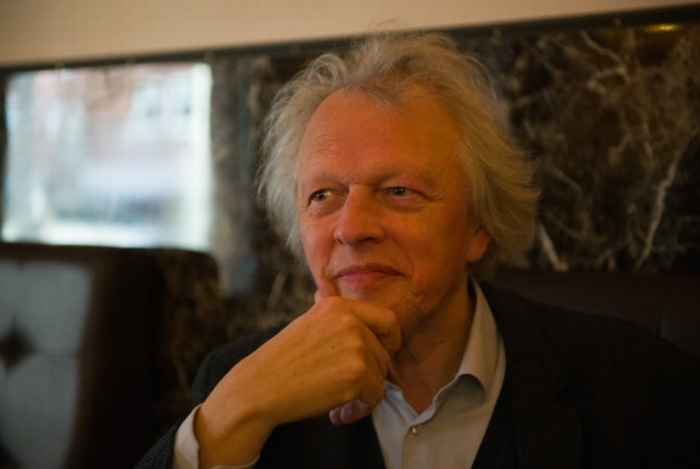'Criminals are increasingly magnified into monsters. There is a danger in that’
Amsterdam Law School
28 May 2024

Where does the vulnerability of the criminal justice system lie?
Sven: ‘I think organized crime makes the criminal justice system more vulnerable than we dare to admit. You can't solve that with politics. Of course, the government must do something about drug trafficking, but just because of the enormous amounts of money involved in this circuit, it is difficult to make a significant difference.'
Ybo: 'I've been looking at organized crime for some time, and I've seen how the framing of it has changed enormously. It used to be about the 'Hakkelaar' who was arrested with a plate of stew on his lap at his mother's house. That still had a somewhat friendly frame. Starting in the year 2000, people became more afraid of organized crime. For example, the Hells Angels hit tv hosts Barend and Van Dorp in the face. Then the idea arises: they are not cuddly criminals, but it is something scary. The word “undermining” was then introduced. Criminals are increasingly magnified into monsters. There is a danger in that. We should not get the idea that organized crime is responsible for all the suffering in the world. I think that image makes the system vulnerable.'
In what sense?
Ybo: 'Because of the specter of organized crime, a lot of expensive measures against money laundering and the like come into play. I don't want to take anything away from the seriousness of organized crime, but it can take the focus of things that are just as important. The simplest example is “uithalers” [people who extract drugs from containers at the behest of criminals, ed.]. What about the opportunities for those young people? Not to make them pathetic, but we need to look at that, too.'
Has organized crime really increased, or is it mainly the spectre?
Ybo: 'If you look through your eyelashes, you see that in the 1980s and 1990s a larger group of Dutch networks emerged, including people with Turkish and Moroccan backgrounds. It is silly to deny that this is an increasing problem. The amount of money involved in the circuit have also increased.'
Sven: 'The police now have a better picture of organized crime because of all the crypto services, such as EncroChat, that have been cracked. The police and the prosecution were shocked by that. You just don't know if this type of crime was as big before. It spurs us to go further and further in detection. The scale of organized crime makes the government want to do something, but relying on high-risk methods, such as crown witnesses and criminal citizen infiltrators, makes the government itself vulnerable. The Marengo case and all that happened there around the crown witness is a tangible example of this. The idea that the government can eradicate organized crime by using these kinds of methods is an illusion. A sense of reality is missing there. Criminals are adaptive. Regardless of the method; organized crime will always remain. But politicians don't like saying that.'
How do you fight organized crime effectively?
Ybo: 'There is not one best route. We do know that organized crime appeals to vulnerable young people. We spend enormous amounts of money on youth care and dyslexia, but there is no money for people who end up in organized crime. Those guys then go to work as “uithalers” in a Rotterdam port for 2,000 euros. It took a long time before this was taken seriously. That irritates me immensely.'
Sven: 'Agreed. We have to do more in terms of prevention, and in terms of spending, we have to achieve a better balance. That's a good start. It is mopping up with a tap that remains open, but you have to mop up something.'
Ybo: 'And above all, don't steer on feasibility. When fighting organized crime it is so much more important that you catch the top dogs and that you don't steer on catching a few guys at the bottom of the chain.'
Have professionals in the criminal justice system become more vulnerable?
Ybo: 'There is more anxiety among people. They feel threatened, and they have reason to be. But that threat by no means comes only from organized crime. It also happens in very different contexts. People can also become very aggressive in family matters.'
Sven: 'I feel that this vulnerability also has something to do with the criticism of sentences and the level of punishments in the public debate. The discussion has hardened, and that makes professionals more vulnerable.'
Ybo: 'Some issues are more part of political discussions. I'm not so upset about that myself. Judges continue to look defendants in the eye. We pay attention to what happened in a case and apply the law.'
Sven: 'Former judge Frank Wieland also showed his own vulnerability as a judge in his book. I like to show that a judge is also someone of flesh and blood. How do you see that?'
Ybo: 'I am half-hearted about that. I have enormous admiration for Frank Wieland and think it's good that he shows his emotions. But I don't think all judges should do that. I wouldn't want to hear from a judge “Do you know it's very scary to do such a scary trial?” The focus should remain on the parties sitting in court. I like the fact that the judge wears a gown and remains anonymous in a sense.'
Sven: 'I did appreciate that Frank Wieland showed what the imposition of a life sentence did to him. But it's true: the gown makes the judge more anonymous. Perhaps it's better to discuss the emotions involved in these decisions with colleagues. However, I also think it could create rapprochement in the courtroom. It's already such an intimidating place to walk into as a defendant. More human contact would be welcome in court.'